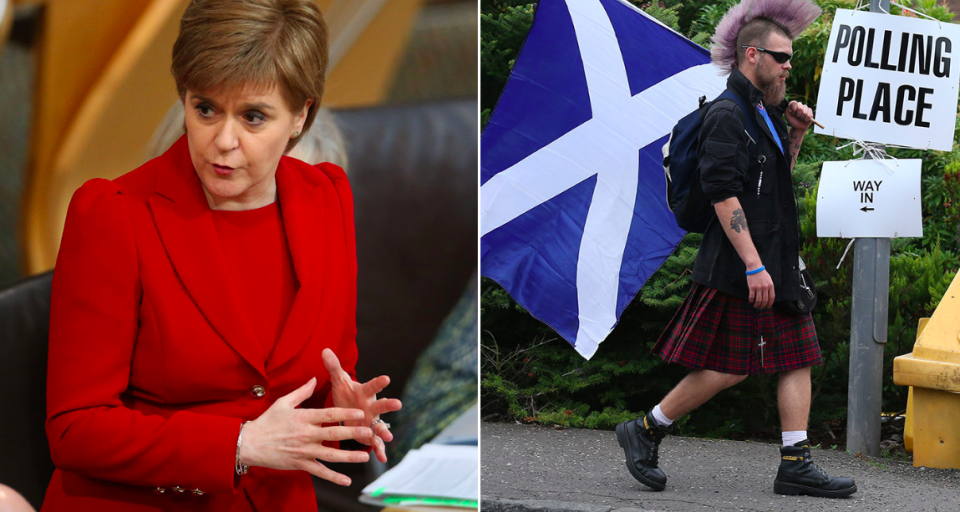The real problem for Nicola Sturgeon is not Brexit, but oil

The first minister of Scotland Nicola Sturgeon has called for another Scottish referendum which could see trade worsen and further uncertainty in the oil price and sterling.
As if the UK doesn’t have enough on its plate already negotiating a good Brexit deal. Sturgeon believes she is making a move to protect Scotland’s own interests.
Analysts warn there are a number of important factors for Sturgeon to consider, before holding a second referendum which could backfire considering Scotland is at the mercy of the oil price.
Mike Pate, partner at Killik and Co says: “Uncertainty created by the fall in oil revenues is real – Scotland would be running a significant budget deficit. Sterling weakness is helpful to the Union, we could envisage a worsening of trade terms for independence through Euro strength and renewed weakness in the oil price going into the vote.”
Scotland depends heavily on oil and gas revenue to keep its economy healthy. The price of oil has been tumbling continuously over the past couple of years.
During 2011-2014 oil was at $100-$110 per barrel. On March 9, 2017, prices fell below $50 a barrel.
Between December 2016 and early March 2017 oil prices have been around $50–$54 a barrel. Over a year ago oil went below $30 a barrel.
[graphiq id=”8JyeUDXAxwN” title=”Crude Oil Futures (NYMEX:CL) – YTD” width=”600″ height=”442″ url=”https://w.graphiq.com/w/8JyeUDXAxwN” link=”http://mutual-funds.credio.com” link_text=”FindTheData | Graphiq” ]
Between December 2016 and early March 2017 oil prices have been around $50–$54 a barrel. Over a year ago oil went below $30 a barrel.
Putting the price of oil into context, Nizam Hamid, head of strategy, WisdomTree explains that oil has been weak and has broken through a threshold of $50 and further weakness is only likely to continue if OPEC fails to meet its production cuts or if there is excess supply from the US.
Hamid says: “As a key macroeconomic variable for the Scottish economy it [low oil price] is clearly not helpful, although the timing of the vote for independence is more entwined with Brexit, EU membership and other political factors.”
If a Scottish referendum goes ahead could this depress sterling further?
We are currently seeing volatile sterling. Tom Selby, senior analyst at AJ Bell comments: “If a second Scottish referendum were to depress the pound further, this trend could continue in the short-term. Conversely, a weak pound increases import prices and this is starting to feed through to the high street in the form of inflation. If this trend continues it could have a negative impact on consumer spending which could hurt domestic stocks.”
Timing is everything when contemplating such a huge political move and with so much volatility already caused by Brexit in the financial markets. Economists warn Scotland it is in not such a good position to leave right now.
Dean Turner, UK economist at UBS Wealth Management says: “Scottish GDP lags behind the UK and declining oil revenues have raised questions over the fiscal sustainability for an independent Scotland – especially if it intends to retain the pound.”
Turner explains while EU membership may provide Scotland with a preferable trade agreement, carving a new membership would be no mean feat and the UK still remains Scotland’s largest trading partner.
So what other hurdles would Scotland face?
If a referendum was to happen and the majority vote “yes” to leave. Scotland should expect a long process ahead. Pate explains there are a number of hurdles in the way for Sturgeon.
He adds: “Firstly, the Scottish Parliamentary vote, secondly, the probability of Westminster recommending it, thirdly, the timetable of the referendum (still some way out Autumn 2018- Spring 2019), fourth, Scotland would need to reapply to the EU, which means joining the back of the queue with a very different deal to Britain, fifth, the unionist/independence split is balanced and skewed to remain.”
Pate says: “Scotland and Scottish commerce are deeply intertwined, so we could expect significant disruption, specifically for the banks, financial sector, leisure sector and also those effected by a change in nuclear policy.”
Did the Scottish referendum in 2014 indicate a likely win?
Turner says if the Scottish referendum held on 18 September 2014 is any indication, a second referendum is most likely to be won or lost on account of voters’ economic concerns.
In 2014 the “No” side won with 55.3% voting against independence and 44.7% voting in favour of leaving the UK.
[graphiq id=”kvXNmcREvxr” title=”Ipsos Mori – Should Scotland be an independent country?” width=”600″ height=”508″ url=”https://w.graphiq.com/w/kvXNmcREvxr” link=”https://www.graphiq.com” link_text=”InsideGov | Graphiq” ]
Turner says: “For an independence referendum to result in a different outcome three years on, Sturgeon will need to provide greater clarity on the economic challenges an independent Scotland may face.”
Businessman and philanthropist Lord Ashcroft has said in the past that more than half of “No” voters cited currency as one of the top reason influencing their decision.
Market reaction to Sturgeon is muted so far
The market has not priced in a possible Scottish referendum.
Turner says: “Market reaction to Sturgeon’s speech has been muted so far, most likely because she still has long way to go to achieve approval for a second Referendum and the announcement was well-flagged. Yet if approval becomes increasingly likely, we expect volatility in sterling to rise.”
Written by London-based journalist Tanzeel Akhtar. Her work has been published in the Wall Street Journal, FT Alphaville, CNBC, Citywire, Euromoney, Interactive Investor.

 Yahoo Finance
Yahoo Finance 
